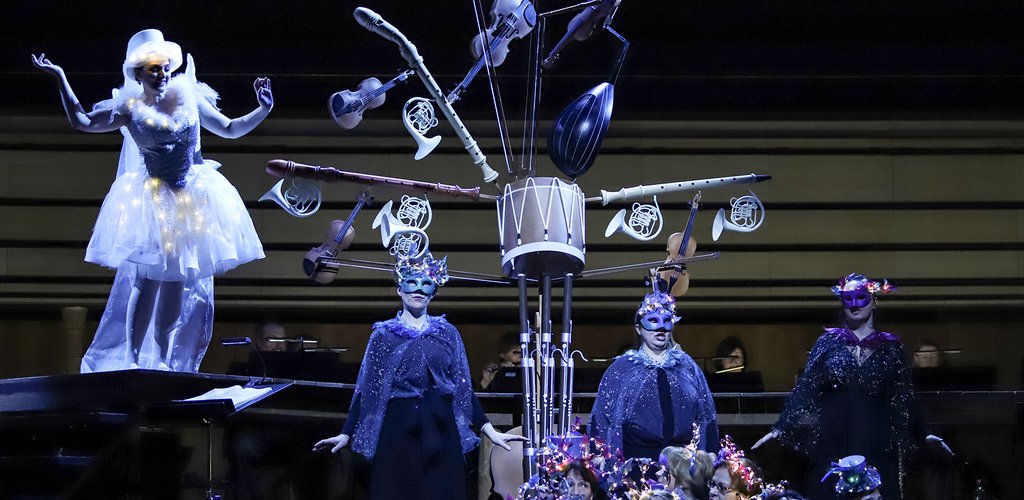After having run out of adjectives, I realised that if I am ever asked again, if the question is posed to me, if anyone in the whole wide world even cares what I regret most about my life, and what I would have done differently, I would answer this: I regret not having become a musician.
Like a child, I would have revelled in being on stage. I am sure that if children today are shown, as part of a “Great Fair of Professions,” the final act of your performance, all of them would be jumping out of their seats shouting, “I want to be a musician! I want to be a musician!”
“And mother, can you imagine? At the end all, of the musicians turned into forest elves and their heads lit up? And Mister John picked up a great big horn and wanted to use it when courting Miss Alice. But then all these forest monsters appeared and scared Mister John away. But I wasn’t scared of them! And everyone played music, sang and even danced; even Mister John cheered up and of course wanted a drink right away. And there was a man there with thinning hair. He did not play music, but stood with his back to us and kept waving his arms. And at the end he was very happy. He was the conductor, you know.”
So, yes indeed, thinking of it as an adult, and having seen this performance
• it is quite an entertaining and enjoyable thing to be a musician; it must be great fun!
• With our music, we bring joy to people; and the people express their joy at the end of the performance with great noise, whistling, stomping and applause.
• And they even pay for it!
Sitting there in the audience, I felt like the proverbial old peasant man (or is he really just mentioned in a joke? - I forget). So he comes “up” to the capital, to Pest, to a performance of Othello. He sits there watching Iago’s conniving until he can no longer take it, and then calls out: “I’m watching you!” So it goes at performances of the Iván Fischer Opera Ensemble. Their performance is so alive, as it breathes and lives before your eyes, that there are moments when you just want to get up and give the antagonist a good slap, or want to kiss the underdog on the forehead. Certainly, Verdi’s Falstaff is a comedy in every sense of the word: there are no sharp lines, no goods vs. evils; it is all a game and a comedy in its essence and above all. And this is exactly what your performance is like.
This was Verdi’s final opera. Growing old, he did not want to write anything new, but he could not resist the libretto for this one. (Let me just praise here, in brackets, the programme booklet: it is very informative and covers all the essentials. It was clearly produced with enthusiasm, love and expertise – as was the performance itself.) In my own reading, I would just add that Falstaff is Verdi’s farewell present to himself and to his audiences. It was a work inspired by an outstanding libretto, but was created for his own pleasure and to honour himself. In the character of Falstaff, Verdi both laughs at himself as an elderly man and also gives himself an encouraging pat. This is why he was so enthusiastic about Boito’s lyrics and why he was willing to put pen to paper again and write the music. For it was himself that he saw in the Don Quixote-like character of Falstaff: old and unattractive on the outside, but desirous of beautiful women, with a yearning for the way things were; lonely, contemplative, yet loud and self-important. And this is why Iván Fischer is perfectly right to say that, “Falstaff is a unique work of art with no prequel or sequel in Verdi’s oeuvre.” A present to all of us, from a genius at peace with himself and with the world.
Finally, one more thought: at the end of the opera, in the final scene, the humiliated Falstaff begins singing all of a sudden, for a short episode, that while they may laugh and scoff at him, they would not exist without him. For he is the dash of salt their lives need. He is the excitement and the variety. Without him, there is no point to the predictable and boring lives of the well-behaved, consolidated citizenry. For me, this brief aside placed the character of Falstaff in a whole new dimension. It was almost as though Don Giovanni had never died in another world. As though he had never been swallowed by the inferno, but his life had continued in another story. As if, say, he is frightened by the Stone Guest and because he regrets his sins, he escapes. But he does not really change his ways: he continues to chase women and enjoy life to the fullest. Ultimately, he grows old and turns into Falstaff. Perhaps I have an overly vivid imagination; but for me, Falstaff is Don Giovanni in another story.
Thank you for your gift to me: yet another opportunity to be a part of a fantastic, unforgettable experience.
József Bodor, a BFO supporter
Mr. Bodor had previously wrote a personal account of our performance of Don Giovanni; click here to read it.
Photos of the opera performance were taken by Judit Horváth.

